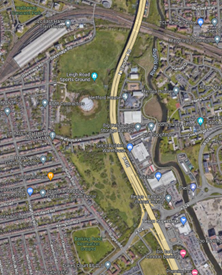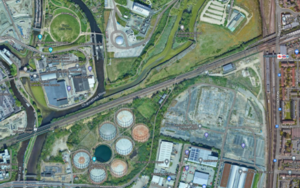Two major new parks needed in Newham, say green space campaigners
CPRE London has today submitted its Response to Newham Local Plan consultation February 2023 saying the borough should create two major new parks to tackle the lack of public green space in the borough.
Campaigner Alice Roberts said: “Newham has the least publicly accessible green space per person of any London Borough – at just 0.71 Hectares per 1,000 people. The good news is the Plan proposes to maintain this ratio, even with projected population growth. But this means creating at least 70 hectares of new green open space and the draft Local Plan falls short of detailing where this will be located.
We’re proposing that two major new parks can and should be created, one in the east and one in the west of the borough.
In the East, part of a new Edgelands Park would include the currently derelict Leigh Road Sports Ground and the green site to the east of Burges Rd. The council plans to reinstate some of the Leigh Road site as parkland, but it also wants to build on part of the site. We think it should be left open in its entirety, connected to the Burges Road site, and a new park created incorporating both. We are urging Newham to work with River Roding Trust and the community to make this a reality for future generations.

In the West, a park should be created from the site to the north of Crows Road, the gas holder site to the north of Twelvetrees Crescent and the waterworks site at Abbey Lane. These should be connected and opened up to the public to create a large green open space nature habitat and sports pitches.

The Local Plan should also do more to protect existing green spaces like West Ham Park which should be given ‘Local Green Space’ designation which affords the same level of protection as Green Belt. The greenhouses at West Harm park, currently under threat from development, should also be protected.”
Among other comments, CPRE London also stated:
Housing targets: There is a significant risk of over-allocation of land for new housing – land which could be used for other purposes, for example to create sustainable transport hubs or new green/open spaces. The annual housebuilding rate proposed is roughly 3,050 each year for 17 years but this significantly outstrips the rate of housebuilding of recent years: in the past 10 years the average net additional dwellings in Newham was 2,128 per year (1,540 per year over the past 20 years). Alice Roberts said: “While we do not seek to challenge the figures for need, we must point out the implications of over-allocating land for housing which is very unlikely, in reality, to be built. Generally, the over-allocation of land means a great deal of land which could be allocated for other important purposes will lie idle for up to twenty years. Targets should be set at lower, realistic levels to ensure land is not wasted and potential for creating new large parks and green spaces is not lost. Also, if and when green space sites are allocated for housing, the high likelihood is these will be built on first, before brownfield sites, undermining the brownfield first principle.”
Roads and transport: Unnecessary large and complex road layouts are taking up very large amounts of space: a policy should be introduced to reduce road space and reallocate it to more sustainable uses. Local transport strategy should limit main roads to one lane only, for general traffic, to support delivery of the Mayor’s Transport Strategy targets and reduce the negative impact of roads in terms of severance and health. Remaining space should be re-allocated for bus or cycle lanes, wider pavements, or SUDS / trees etc, or in certain circumstances, even built development.
Kerbside space: In Newham takes up something like 200 football pitches worth of space – mostly public space. A Kerbside Space policy should be introduced. A policy should be included which recognised the importance of reallocating this space for sustainable uses which support both active travel and environment goals. A minimum of 25% of Newham’s kerbside should be used for bus and cycle lanes, safe cycle storage, shared mobility parking, delivery hubs, rain gardens, tree planting on build-outs, EV charging points on build-outs, parklets, pocket parks, play on the way features/play trails, and whole streetparks; delivery and shared mobility hubs.
To support our campaigns to support green space creation in areas of green space deprivation please give here








